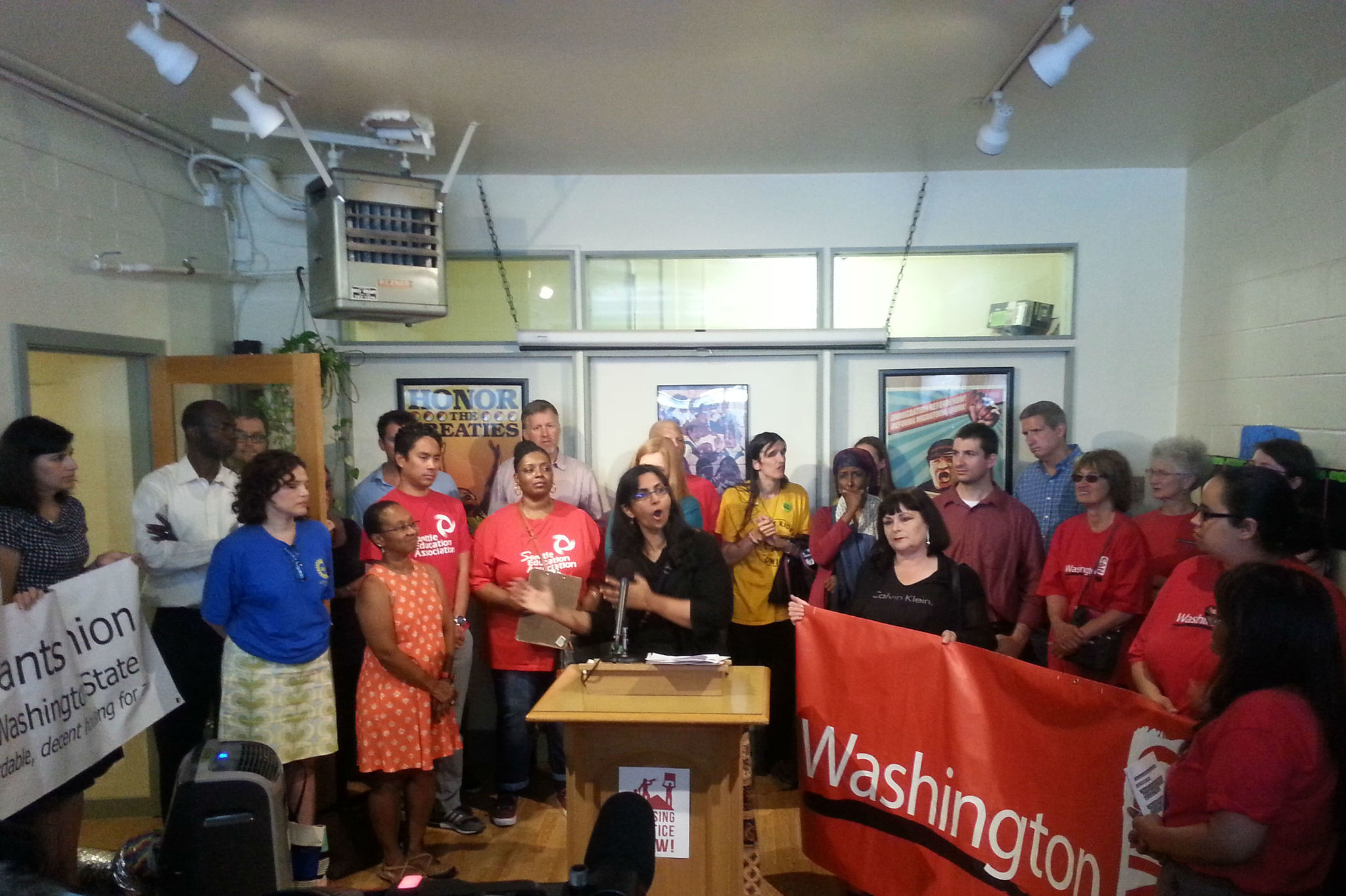Inside Washington CAN’s office by Yesler and 18th, the air is moist with human sweat. More than two dozen organizers and activists are lined up against the far wall like a choir for the benefit of cameras. District 3 Seattle city councilmember Kshama Sawant stands in the middle of the group, alongside former Tenants Union director Jon Grant, state legislative candidate Nicole Macri, and Columbia Legal Services’ Yurij Rudensky. Also present are city councilmembers Lisa Herbold (D1) and Mike O’Brien (D6), the latter of whom just biked uphill from city hall and now, in the baked-potato-in-a-hot-tub-like climate of WA CAN’s office, resembles a determinidely cheerful used bath towel.
The 40 or so people packed into this garage-sized room are here about two things: a new report and a new bill. The report, authored by WA CAN organizers Xochitl (“So-chi”) Maykovich and Margaret Diddams, Ph.D, affirms what we all already know: rising rents are pricing poor families out of Seattle, and landlords hella discriminate.
The main event, though, commences when Sawant sloshes her way to the podium, after several activists have spoken, to detail her new bill to cap renters’ move-in costs. Addressing the crowd, the councilmember emphasizes that this bill does little by itself and is intended as part of a larger strategy for addressing the housing affordability crisis through socialist-ish policies.
”The laws of this state are overwhelmingly stacked against renters, particularly the state ban on rent control,” Sawant says. “But there are so many loopholes in Seattle’s law that could easily be fixed by the city council.” Case in point: according to a draft handed out at the press conference, Sawant’s bill would address the “relocation crisis”—her term for poor families being pushed out by rising rents—by capping the amount of money that landlords can charge a new tenant and by giving tenants a legal right to pay some move-in costs in montly installments instead of up front. Specifically, the bill would require that “the total amount of a security deposit and nonrefundable move-in fees may not exceed the amount of the first full month’s rent.” There would be other restrictions, too:
- Landlords would only be allowed to charge certain kinds of one-time move-in fees which are clearly defined in the legislation. They couldn’t just make new fees.
- In addition to first and last month’s rent, landlords may only charge new tenants for move-in costs equal to up to 10 percent of their first month’s rent (with a small exception for background check costs).
- Tenants have a right to pay their last month’s rent, security deposit, and move-in fees in up to six monthly installments, depending on the length of the lease.
- If they try to create or enforce leases that violate any of these rules, landlords are liable for hefty fines—mostly paid to the tenant(s).
Gwendolyn Jimerson, a school aid, says that many of her colleagues “do not live in the city [where] we work. We can’t afford to. We travel…hours a day to get to our places of employment.” She and her peers do their best at work, “but it’s hard when oftentimes you’re tired before you get to work.”
Councilmember Lisa Herbold spoke in favor of further potential legislation prohibiting landlords from discriminating against certain types of unorthox income such as childcare payments. “Currently, some rely on temporary or long term assistance that’s a primary source of income are categorically determined to not be suitable to tenants without a potentional landlord looking at other issues related to their suitability, such as their prior rental history,” she says.
Ultimately, Sawant says, “we have no option but to fight for tenants’ rights and reasonable rents in this city, because there is nowhere else to go. Not only is it our right to live in this city…but also, where would we go? We see the same trends of skyrocketing rent in the peripheral area around Seattle.
“Where are the people who run this city every single day going to go?” she asks. “They’re not going to go anywhere. They’re going to stay right here and fight for their rights.” The fervent applause that erupts when she says this is slightly muffled by the air’s warm dampness.








